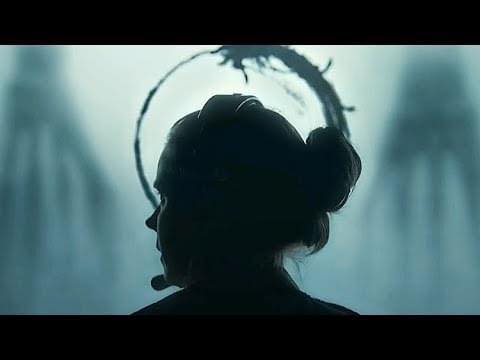“Arrival”: A Profound Exploration of Language, Time, and Human Connection

Introduction
“Arrival,” directed by Denis Villeneuve and released in 2016, is a science fiction film that transcends the genre with its intellectual depth and emotional resonance. Adapted from Ted Chiang’s short story “Story of Your Life,” the film stars Amy Adams as Louise Banks, a linguistics professor recruited by the military to communicate with extraterrestrial beings. “Arrival” is celebrated for its thought-provoking narrative, exploring themes of communication, empathy, and the nature of time, making it a standout in modern science fiction cinema.
Plot and Characters
The story begins with the sudden appearance of twelve alien spacecraft at various locations around the globe, inciting widespread fear and uncertainty. The U.S. military enlists Louise Banks (Amy Adams) and theoretical physicist Ian Donnelly (Jeremy Renner) to decipher the aliens’ complex language and determine their intentions. The extraterrestrials, referred to as Heptapods, communicate through intricate circular symbols that challenge human understanding.
As Louise delves deeper into the Heptapod language, she experiences profound shifts in her perception of time and memory. The film interweaves her personal story with the global effort to understand the alien visitors, highlighting her emotional journey and the revelations that alter her consciousness. Amy Adams delivers a nuanced and compelling performance, grounding the film’s speculative elements in human emotion and vulnerability.
Direction and Cinematography
Denis Villeneuve’s direction is marked by meticulous attention to detail and a focus on creating a tense, atmospheric experience. The film’s visual style, crafted by cinematographer Bradford Young, uses muted colors and stark contrasts to evoke a sense of otherworldliness and introspection. The design of the Heptapods and their environment is both eerie and mesmerizing, emphasizing the alien nature of their presence while maintaining a sense of awe.
Jóhann Jóhannsson’s haunting score further enhances the film’s emotional and philosophical depth. The music, with its ethereal and somber tones, complements the narrative’s exploration of profound and often unsettling concepts. Villeneuve’s use of sound and silence adds to the tension and immersive quality of the film, making “Arrival” a sensory and intellectual journey.
Themes and Emotional Resonance
“Arrival” is distinguished by its exploration of complex themes such as language, time, and human connection. The film delves into the idea that language shapes our perception of reality, a concept that becomes central to Louise’s interactions with the Heptapods. As she learns their language, she begins to experience time non-linearly, leading to revelations about her past, present, and future.
The film’s narrative structure, which intertwines Louise’s personal memories with the unfolding events, underscores the interconnectedness of time and memory. This approach challenges viewers to reconsider their own perceptions of reality and the passage of time. “Arrival” also explores the power of communication and empathy in bridging seemingly insurmountable divides, whether between different species or among humans themselves.
Amy Adams’ portrayal of Louise Banks anchors these abstract concepts in a deeply human context. Her performance conveys the character’s intellectual curiosity, emotional depth, and resilience, making Louise a relatable and compelling protagonist. The film’s emotional impact is heightened by its focus on personal loss, love, and the choices that define our lives.
Critical Reception and Legacy
“Arrival” received widespread critical acclaim for its originality, philosophical depth, and emotional poignancy. It garnered numerous accolades, including Academy Award nominations for Best Picture, Best Director, and Best Adapted Screenplay. The film’s intelligent storytelling and thought-provoking themes resonated with audiences and critics alike, cementing its status as a modern science fiction classic.
The film’s legacy lies in its ability to provoke reflection on the nature of communication, the fluidity of time, and the connections that define our existence. “Arrival” continues to be a touchstone for discussions about the potential impact of first contact with an alien species and the broader implications of how we understand and interact with the world.
Conclusion
“Arrival” is a cinematic masterpiece that transcends the boundaries of science fiction to offer a profound exploration of language, time, and human connection. Denis Villeneuve’s visionary direction, combined with Amy Adams’ powerful performance and a meticulously crafted narrative, creates a film that is both intellectually stimulating and emotionally resonant. “Arrival” invites viewers to ponder the mysteries of existence and the profound ways in which our perceptions shape our reality, ensuring its place as a standout in modern cinema.










